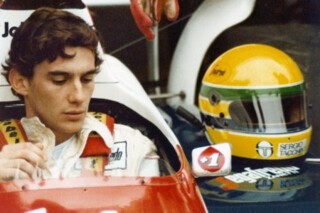Drivin’ in the Rain
Geoffrey Hawthorn · Senna
The figures are impressive. In December 2009, a poll of 217 drivers in Formula One, past and present, voted Ayrton Senna the best of all time. Three-quarters of more than 12,000 readers of Autosport agreed. Senna held records long after he was killed on the Imola circuit in 1994 and no one has yet matched his six wins at Monte Carlo, arguably the trickiest track of all. He devoted a good part of his $400 million fortune to a children’s charity in Brazil, the crowd at his funeral in São Paulo was the largest ever in the city, and on the sort of count that the medieval Church used to keep of shrines, it is said that his grave is visited by more people than those of John Kennedy, Marilyn Monroe and Elvis Presley combined. ‘Nothing,’ his headstone says, ‘can separate me from the love of God.’ And he was pretty. If ever there was a subject for film.
Asif Kapadia’s Senna doesn’t follow the usual documentary format (as he puts it, 40 per cent footage, 40 per cent interviews, 20 per cent bits and pieces). It’s a deliberate three-act tragedy. Senna said that his first world championship was an act of God, and so, Kapadia says, was his death. (The courts have not been able to agree.) But since, as Kapadia remarks, with some exaggeration, motor racing is ‘a sport made by television’, there’s no shortage of action. No motorhead will be pleased by the film’s slight attention to the cars, which have been rather important. But even for those like me who have only ever encountered a wet corner on a trip to the station, the driving speaks for itself. Senna loved the rain: he went faster in it, and braked later, than anyone else. The fascination, above all, is in the man, in himself and in relation to Alain Prost, his only serious rival and the villain of Kapadia’s piece.
Prost was almost as successful as Senna, and almost as ruthlessly dedicated to winning. Like anyone, he did what he could to win on the track. But Prost also did everything he could to prepare in advance, not least in arranging things with his team-mate, who in 1988 and 1989 was Senna. Prost was an intelligible genius. And he is still alive. Senna prepared well too, but was at his most ruthless when driving. In the most revealing moment in the film, he is being interviewed by Jackie Stewart. Stewart observes that Senna has had more collisions than any other driver. Senna is quietly bewildered, not by the fact, but by the suggestion that it should matter. He doesn’t just explain to Stewart (himself a three-time world champion) that he is the best, and the best has to win; he does so with the certainty of someone who believes he is doing God’s work. It’s as chilling as the more practical fact that on the morning of his death, Senna moved to revive the safety section of the Grand Prix Drivers’ Association.

Comments
Only statistically that's not true, Prost won 4 championships to Senna's 3 and won 51 races to Senna's 41. Most F1 fans, including Senna fans, felt the film to be unfair in it's portrayal of Prost. Don't exacerbate that by getting the basic facts so wrong.
I do find "best of all time" amusing. That usually means the best in the last few years. A number of pre-war drivers were arguably more skilful than any postwar one. For instance, there was Bernd Rosemeyer, the only driver who could really tame the unruly Auto-Union type C racing cars.